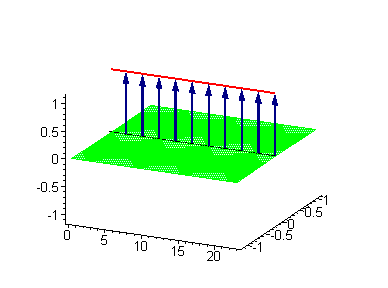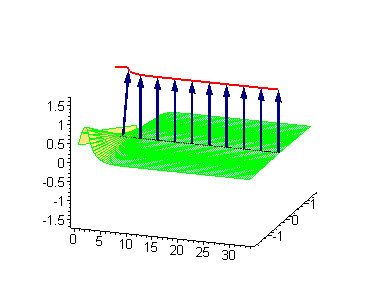Breather
In physics, a breather is a nonlinear wave in which energy concentrates in a localized and oscillatory fashion. This contradicts with the expectations derived from the corresponding linear system for infinitesimal amplitudes, which tends towards an even distribution of initially localized energy.
A discrete breather is a breather solution on a nonlinear lattice.
The term breather originates from the characteristic that most breathers are localized in space and oscillate (breathe) in time.[1] But also the opposite situation: oscillations in space and localized in time, is denoted as a breather.


Overview


A breather is a localized periodic solution of either continuous media equations or discrete lattice equations. The exactly solvable sine-Gordon equation[1] and the focusing nonlinear Schrödinger equation[2] are examples of one-dimensional partial differential equations that possess breather solutions.[3] Discrete nonlinear Hamiltonian lattices in many cases support breather solutions.
Breathers are solitonic structures. There are two types of breathers: standing or traveling ones.[4] Standing breathers correspond to localized solutions whose amplitude vary in time (they are sometimes called oscillons). A necessary condition for the existence of breathers in discrete lattices is that the breather main frequency and all its multipliers are located outside of the phonon spectrum of the lattice.
Example of a breather solution for the sine-Gordon equation
The sine-Gordon equation is the nonlinear dispersive partial differential equation
with the field u a function of the spatial coordinate x and time t.
An exact solution found by using the inverse scattering transform is:[1]
which, for ω < 1, is periodic in time t and decays exponentially when moving away from x = 0.
Example of a breather solution for the nonlinear Schrödinger equation
The focusing nonlinear Schrödinger equation [5] is the dispersive partial differential equation:
with u a complex field as a function of x and t. Further i denotes the imaginary unit.
One of the breather solutions is [2]
with
which gives breathers periodic in space x and approaching the uniform value a when moving away from the focus time t = 0. These breathers exist for values of the modulation parameter b less than √ 2. Note that a limiting case of the breather solution is the Peregrine soliton.[6]
See also
References and notes
- 1 2 3 M. J. Ablowitz; D. J. Kaup; A. C. Newell; H. Segur (1973). "Method for solving the sine-Gordon equation". Physical Review Letters. 30 (25): 1262–1264. Bibcode:1973PhRvL..30.1262A. doi:10.1103/PhysRevLett.30.1262.
- 1 2 N. N. Akhmediev; V. M. Eleonskiǐ; N. E. Kulagin (1987). "First-order exact solutions of the nonlinear Schrödinger equation". Theoretical and Mathematical Physics. 72 (2): 809–818. Bibcode:1987TMP....72..809A. doi:10.1007/BF01017105. Translated from Teoreticheskaya i Matematicheskaya Fizika 72(2): 183–196, August, 1987.
- ↑ N. N. Akhmediev; A. Ankiewicz (1997). Solitons, non-linear pulses and beams. Springer. ISBN 978-0-412-75450-0.
- ↑ Miroshnichenko A, Vasiliev A, Dmitriev S. Solitons and Soliton Collisions.
- ↑ The focusing nonlinear Schrödinger equation has a nonlinearity parameter κ of the same sign (mathematics) as the dispersive term proportional to ∂2u/∂x2, and has soliton solutions. In the de-focusing nonlinear Schrödinger equation the nonlinearity parameter is of opposite sign.
- ↑ Kibler, B.; Fatome, J.; Finot, C.; Millot, G.; Dias, F.; Genty, G.; Akhmediev, N.; Dudley, J.M. (2010). "The Peregrine soliton in nonlinear fibre optics". Nature Physics. 6 (10): 790. Bibcode:2010NatPh...6..790K. doi:10.1038/nphys1740.